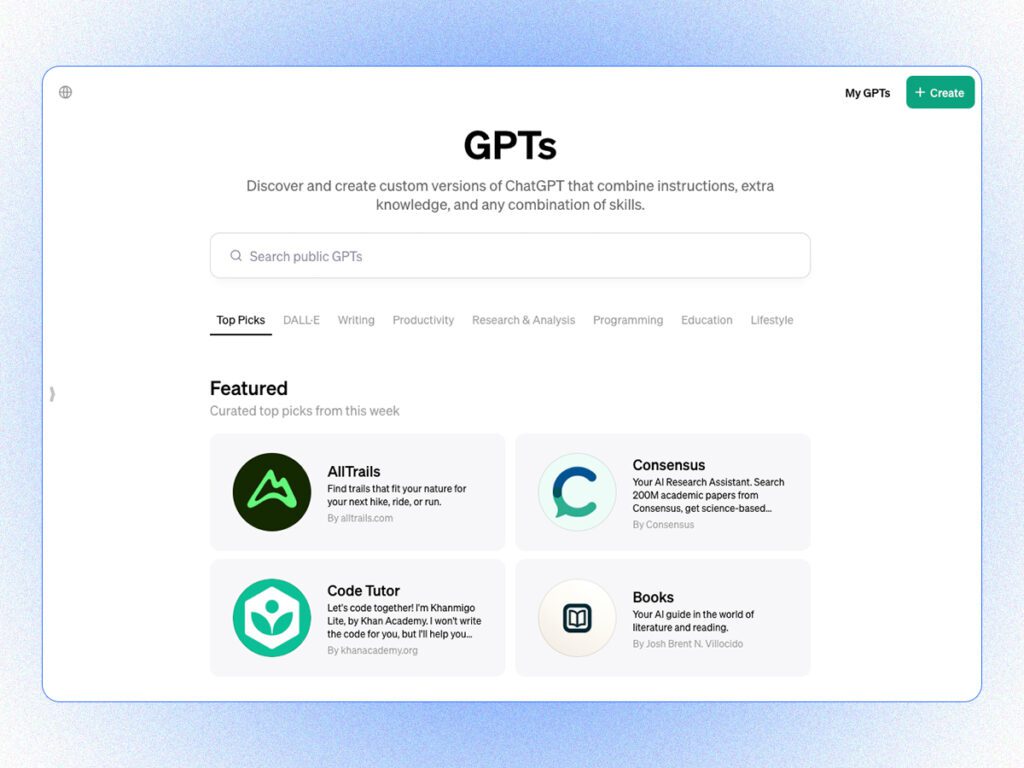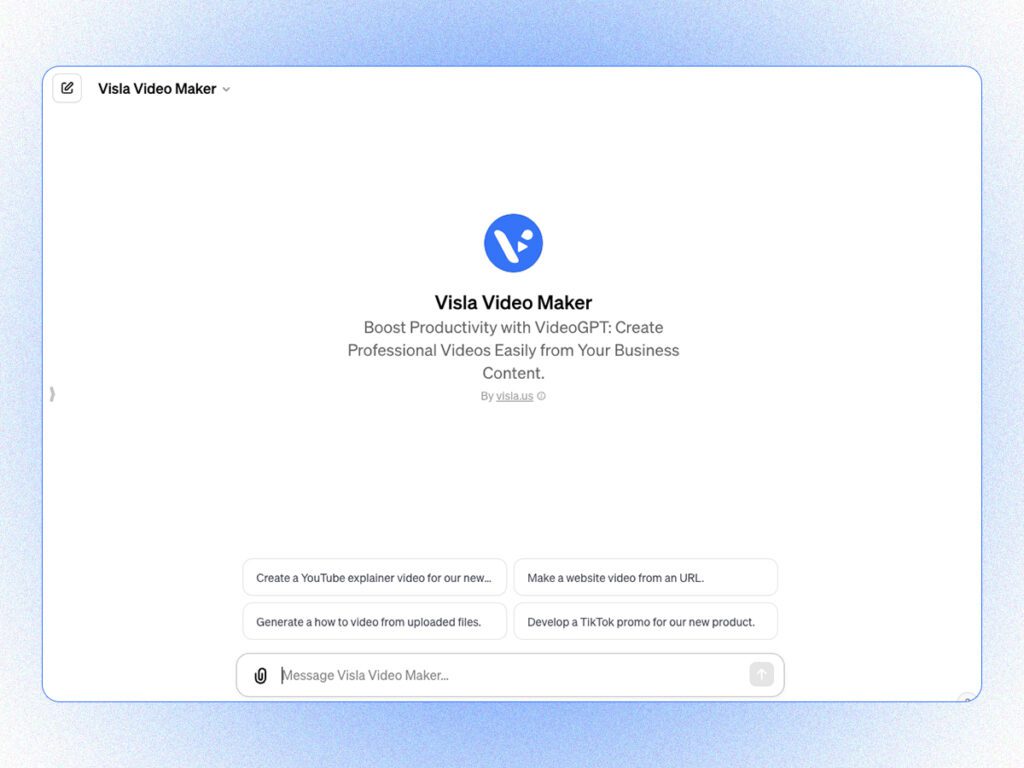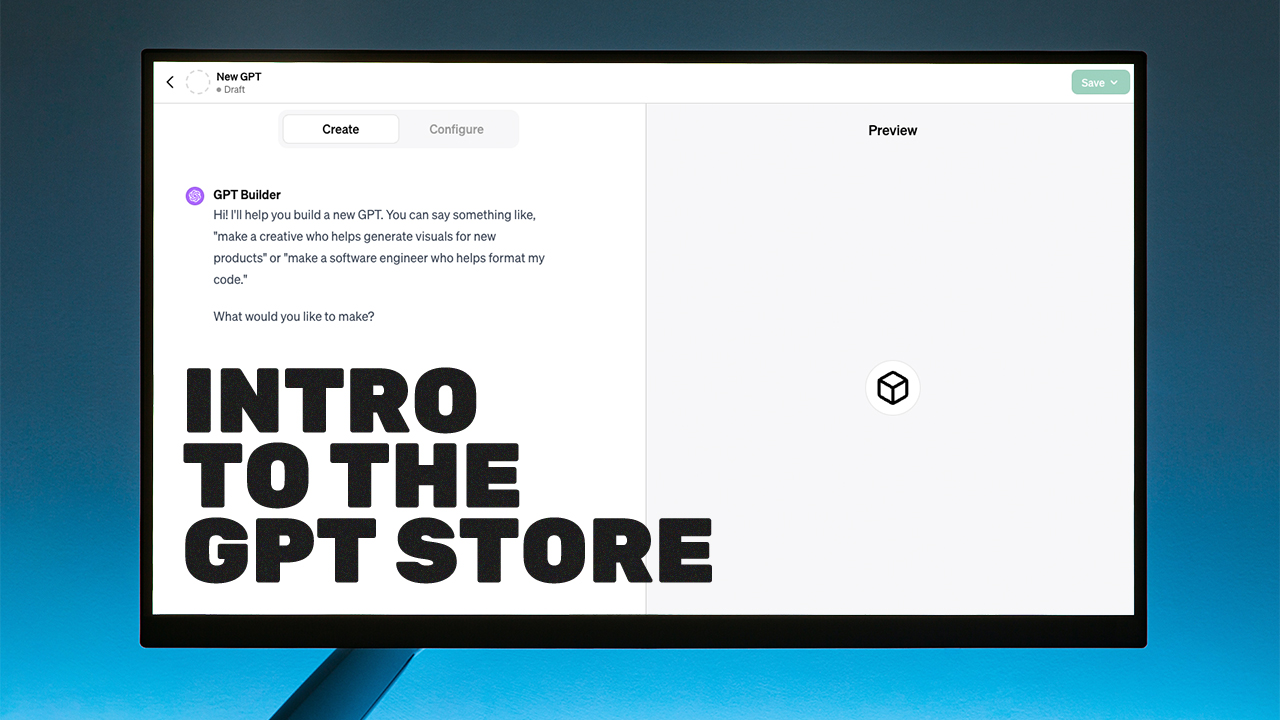Welcome to the future of business innovation with OpenAI’s latest offering: the GPT Store. This platform is a groundbreaking development in the AI world, revolutionizing how businesses interact with technology. Stay tuned as we dive into the depths of the GPT Store and explore how custom GPTs are reshaping the landscape of business efficiency and innovation.
The GPT Store, Explained
In the swiftly evolving AI landscape, the GPT Store is a powerful strategic resource for businesses. Recently launched, it’s a platform where over 3 million custom versions of ChatGPT, created by users, are available for use. This innovation marks a significant stride in AI application for businesses, providing access to a wide array of specialized GPTs.

At its core, the GPT Store is a repository and showcase of diverse GPTs, catering to various business needs. From enhancing DALL·E writing skills to streamlining programming processes, the store offers GPTs across multiple domains like research, education, and lifestyle. It’s not just about quantity; the store also emphasizes the quality and impact of these GPTs.
What Is a Custom GPT?
Custom GPTs represent a leap forward in AI customization, allowing businesses to tailor ChatGPT to their specific needs. These GPTs are not just another AI tool; they are personalized solutions designed to align with specific business tasks and objectives.

Originally, ChatGPT was a one-size-fits-all solution, but with the increasing demand for tailored AI, custom GPTs were introduced. They serve as sophisticated, adaptable tools that businesses can mold to fit their unique requirements, from automating routine tasks to enhancing customer interactions. This shift towards customization indicates a growing trend in AI: providing tools that not only perform tasks but also adapt to the specific workflow and culture of a business.
Will the GPT Store Impact Your Business?
The GPT Store could be a game-changer in the business world, but its true impact hinges on how businesses perceive and integrate this technology. The key question is not just what the GPT Store offers, but how it translates into real business value.
In the realm of operational efficiency, the GPT Store could prove to be a significant asset. Custom GPTs can automate routine tasks, from customer inquiries to data analysis, freeing up valuable human resources for more complex and creative tasks. This shift towards automation is not just about saving time; it’s about reallocating human intelligence to areas where it matters most, like strategy and innovation.

Another critical aspect is customer engagement and experience. In a digital age where personalization is key, custom GPTs offer a way to interact with customers on a more tailored and individual level. For instance, a GPT designed for a retail business can provide personalized shopping advice, while one for a tech company can offer detailed technical support. This level of personalization can significantly enhance customer satisfaction and loyalty. However, it’s crucial to balance AI interaction with human touch, as over-reliance on AI can lead to impersonal customer experiences.
Lastly, there’s the matter of competitive advantage. Early adopters of the GPT Store’s capabilities could leapfrog their competition, especially in sectors where innovation and quick information processing are crucial. On the flip side, businesses that delay exploring these technologies might find themselves struggling to catch up. The challenge for businesses will be in identifying the right areas for GPT integration, ensuring that it complements rather than overshadows human skills and judgment.
How to Make Your Own Custom GPT for the GPT Store
Creating your own custom GPT for the GPT Store is a game-changer for businesses looking to leverage AI for specific tasks. It’s a straightforward process that can significantly enhance your operational efficiency and customer engagement.

Step 1: Identify Your Business Needs
Start by pinpointing the specific tasks or problems you want your custom GPT to address. This could range from automating customer service responses to generating specialized content.
Step 2: Access the GPT Creation Platform
Visit the official GPT creation platform. This is where you’ll begin the actual process of creating your custom GPT.
Step 3: Set Instructions and Knowledge Base
Provide your custom GPT with clear instructions and any extra knowledge it needs to perform its designated tasks. This step is crucial for ensuring your GPT operates effectively within your business context.
Step 4: Define Capabilities
Choose the capabilities you want your GPT to have, such as web searching, image creation, or data analysis. These should align with the tasks you identified in Step 1.
Step 5: Test and Refine
After setting up your GPT, test it thoroughly to ensure it meets your business needs. Refine and adjust as necessary to optimize its performance.
Step 6: Publish to the GPT Store
Once you’re satisfied with your custom GPT, publish it to the GPT Store. This makes it available for your team or other users, depending on your preference.
Why You Should Make Your Own GPT for the GPT Store
Creating a custom GPT for the GPT Store can bring a range of benefits to your business
| Team | Use Case |
|---|---|
| Marketing | Create AI-driven content strategies, generate SEO-optimized copy. |
| Communications | Automate press releases, handle internal communications efficiently. |
| HR and People Ops | Streamline recruitment processes, answer employee FAQs. |
| Corporate Learning | Develop AI tutors for staff training, automate learning materials. |
| Sales and Revenue | Generate tailored pitches, automate lead qualification. |
| Product | Gather user feedback analysis, assist in product development. |
| Customer Success | Automate customer support, provide instant query resolutions. |
Oh, and while you’re here, feel free to check out Visla’s own custom GPT.


Leave a Reply
You must be logged in to post a comment.